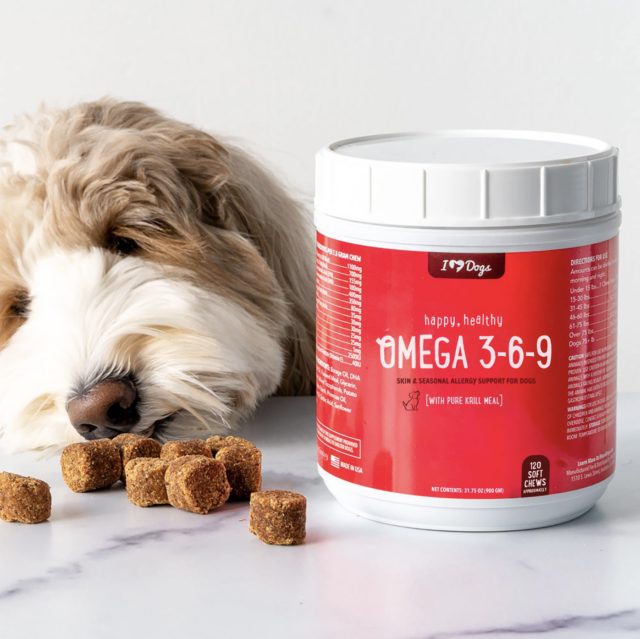So many dog breeds have health concerns – some minor, some major. Many poodle owners struggle with skin and coat issues. Coats can become dull and thin, and some poodles are constantly scratching or biting at their skin.
What to do about dull coats and skin problems in poodles
On a recent visit to my vet, I asked if there were something I could do to help, and the vet asked if I gave the dogs an Omega supplement. I explained that I gave the dogs a high-quality dog kibble that claimed to have a balance of nutrients, including Omega-3 fatty acids.
This is where I learned my first mistake.

My vet explained how dog food, even though it claims to contain Omega-3, rarely has any fatty acids that are biologically available to dogs. Biologically available? I had to have my vet expand on that one. Apparently, when dog food is processed, it is exposed to high heat. Omega fatty acids just so happen to be very sensitive to high heat. So by the time you pour Fido a bowl of kibble, the essential fatty acids are no longer in a state that is beneficial to your dog. In addition to dry, itchy skin and unhealthy coats, I was told that Omega-3 deficient diets also lead to:
-
Prolonged healing of wounds
-
Increased allergic reaction effects
-
Decreased immune system function
-
Painful joints
-
Excessive inflammation
-
Hair loss
-
Ear infections
-
Hot spots
-
Excessive itching
Fortunately, my vet offered a solution. She recommended that I start my dogs on an Omega-3 fatty acid supplement. Sounds easy? Not so much.
I also learned that all supplements are not created equal. The ingredients that are used to derive the fatty acids is key. I think most people know that salmon is high in Omega-3’s, but did you know that it’s also high in toxins, such as lead and mercury?
But Wait, There’s More Than Just Omega-3. Have You Heard of Omega-6 and Omega-9?
Omega-3, Omega-6, and Omega-9 fatty acids contribute significantly to the health and well-being of dogs. They aid in controlling inflammation, promoting healthy skin and coat, and bolstering the immune system. Omega-3, in particular, supports cardiovascular health and cognitive function, and may mitigate effects of arthritis. Omega-6 contributes to cellular health, while Omega-9, although produced naturally by dogs, when supplemented can help regulate blood sugar and cholesterol. Thus, a balanced intake of these fatty acids helps maintain overall health and vitality, enhance the quality of life, and potentially increase the longevity of your furry companion.
The Solution to Your Poodle’s Skin & Coat Issues
I was recently turned on to an amazing product called Omega-3-6-9 Krill Oil chews. (also avaiPoodlele on Amazon) They are made from the highest quality krill oil, which contains a special type of Omega-3 that boosts absorption. Within a few weeks of having my dogs take the chews, I began noticing that they weren’t itching as much and their coats looked shiny and healthy. These were just the benefits that I could see.
The Right Omega-3 Makes All the Difference
So do yourself a favor…get your dog on an Omega-3-6-9 supplement. My dogs seem to love the taste of the Omega-3-6-9 Krill chews. Plus, when you purchase these chews, you also be providing up to 21 meals for shelter dogs. So talk to your vet. To friends. Find what’s best for your dogs. Just make sure you make an Omega-3 supplement part of your dog’s daily diet. They’re lives are short enough, we think they deserve the best we can give!
Shop the Omega 3-6-9 Krill Oil Chews on iHeartDogs.com
or available through Amazon Prime
Additional Benefits of Omega-3 for Poodles
Omega-3 fatty acids are beneficial for dogs in various ways beyond skin and coat health. They contribute to cardiovascular well-being by supporting heart health. They play a crucial role in brain development in puppies and may improve cognitive function in older dogs. They can help reduce inflammation, which is particularly beneficial for dogs with joint issues or arthritis. They can also boost a dog’s immune system and help fight off diseases. Furthermore, they can contribute to eye health and potentially prevent certain eye conditions. Therefore, incorporating omega-3 into a dog’s diet is highly beneficial. You can learn more by visiting our review of the best fish oil for dogs or the best skin and coat supplement for dogs.
Top 9 Pet Insurance Plans for Poodles
- CBD for Poodles: What You Need to Know
- Best Supplements for a Senior Poodle
- Best Flea & Tick Products for Poodles
- Best Online Dog Training Courses for Poodle
- Best Hip & Joint Supplement for a Poodle
- What Supplements Should I Give a Poodle Puppy?
- The 9 Best Poodle Puppy Foods
- Best Dog Beds for Poodles
- Improve Your Poodle's Skin & Coat with This One Hack
- Giving This to Your Poodle Daily Can Alleviate Itchy Allergies
- 6 Natural Ingredients to Fight Your Poodle's Allergies
- 8 Ways to Stop Your Poodle's Scratching
- 7 Ways to Calm Your Poodle's Anxiety
- 6 Remedies for Your Poodle's Diarrhea, Gas, or Vomiting
- 7 Best Dental Chews for a Poodle

 Toledo, United States.
Toledo, United States.